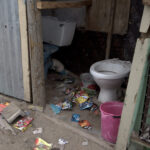Children who experience discrimination may be more at risk of mental and physical ill-health.
Children exposed to racism could be at an increased risk of depression, anxiety and attention-deficit hyperactivity disorder (ADHD), new research shows.
The research, presented at the Pediatric Academic Societies’ meeting last week in San Francisco, asked the parents of more than 95 000 children in the United States to report their child’s experience of racial discrimination and whether the children experienced declines in health.
Multiple studies have shown that poverty negatively affects health. To control for this and other biases, researchers in the US study grouped children by factors such as race, sex and family income so that the children were compared to others with similar characteristics.
The study found that children who were exposed to racial discrimination were twice as likely to develop anxiety and depression when compared to children who did not experience racism. Children who faced racism were also about 3% more likely to develop ADHD.
ADHD is a chronic condition in which children struggle with difficulty to concentrate, hyperactivity and impulsive behaviour, says the US health nonprofit Mayo Clinic.
In the study, the proportion of children who were characterised as being in excellent health was about 5% higher among those who had reportedly not encountered racism than in those who had.
Low-income children of colour exposed to racism showed the biggest decrease in health – both generally and psychologically.
White children from high-income groups who experienced discrimination showed a decrease in general health, while black children in the same income bracket showed increased rates of ADHD.
Although the study is limited by its reliance on parents’ perception of their child’s experience of racism, lead author and assistant professor of paediatrics at University of California Ashaunta Anderson says the research makes strides in proving that exposure to racism can be a direct cause of ill health.
A 2015 systematic review of 239 studies, published in the PLoS ONE journal, also linked to racial discrimination to poorer mental and general health.
Is giving your child the tools to talk about race enough?
In South Africa, there is a shortage of recent studies on the effects of racism on children’s health. A 2008 study published in the journal of Social Science & Medicine showed black, Indian, and coloured South African adults were more likely to report ill health as a result of discrimination than their white counterparts.
US researchers say the findings should prompt parents, teachers and health workers to give children mechanisms to cope with discrimination.
Anderson says talking to children about race could help combat the effects of discrimination.
She explains: “Adults don’t necessarily poison children with fears about other people on purpose, but telling children they cannot trust certain people leaves them with no coping strategy to deal with their environment. This is linked to decreased mental health and a drop in school performance.
“Kids learn from an early age that they shouldn’t talk about race because it’s something big and scary. Instead, they should be taught to celebrate diversity.”
She says teaching children to be proud of their traditions, historical figures and languages is also linked to improved behaviour and mental health.
But South African experts argue anti-racist lessons learnt at school aren’t always enough to prepare children for the country’s pervasive culture of racism.
University of the Witwatersrand medical anthropologist Lenore Manderson explains: “Even if you don’t experience racism directly as a child, you see it everywhere. There is disparity underlined at every moment.
“Your family may not be racist, but your grandparents grew up in a profoundly racist environment. Part of family building is to tell those stories, and that can have an impact on your own sense of self-worth.”
Manderson says the link between oppression and depression should be framed as a social issue and not just a medical problem.
She argues: “We should rather make inroads to reduce inequalities and to build up a system where kids have confidence in their abilities, and their confidence should be based on what they can do and not undermined by ethnic background.”
Joan van Dyk was a health journalist, senior health journalist and news editor at Bhekisisa between 2017 and 2023.




